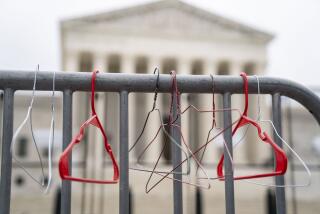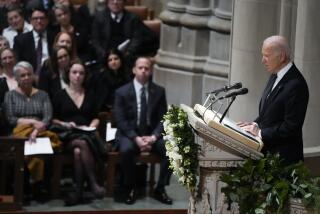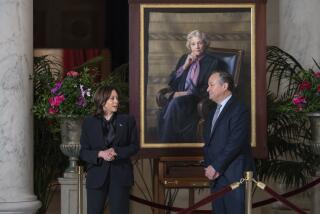Bush Starts Pondering O’Connor’s Successor
- Share via
WASHINGTON — President Bush narrowed his focus to several judges Tuesday as he began considering a successor to Sandra Day O’Connor, the country’s first female Supreme Court justice, who announced her retirement Friday.
The president spent “a good couple of hours” reviewing the biographies of the candidates and summaries of their judicial opinions during a 7 1/2 -hour flight to Copenhagen on his way to an international economic summit, said White House Press Secretary Scott McClellan.
But the White House offered few new clues about whom Bush might choose or when. In an interview before his trip, the president suggested that he might take up to several weeks to name O’Connor’s successor.
In an interview published Tuesday in USA Today, Bush said he would start homing in on “a handful of candidates over the course of the next few weeks,” adding that he intended to interview some of the candidates.
Within hours of O’Connor’s retirement announcement, Congress and interest groups spanning the political spectrum began gearing up for what could be a protracted struggle over the first Supreme Court nomination in 11 years.
Although McClellan’s comments Friday had fueled expectations that Bush could name O’Connor’s successor within days after returning from Europe this Friday, the president’s remarks seemed to indicate that he would take more time.
In the USA Today interview, Bush dodged a question about whether a delayed announcement -- perhaps until August -- would leave his political opponents less time to mount a full-scale attack.
Republicans have come to rue some past battles over Supreme Court nominees, when long delays between the nominations and the Senate confirmation hearings allowed prolonged political wrangling.
For example, President Reagan selected Judge Robert H. Bork on July 1, 1987, but the hearings did not begin until early September. In the intervening two months, a coalition of liberal and civil rights groups mounted a broad attack that damaged Bork’s reputation and sank his nomination.
The same was true in 1991 when the first President Bush chose Judge Clarence Thomas for the Supreme Court. Throughout July and August, Thomas’ opponents dug up information that undercut his nomination, including allegations of sexual harassment. He ultimately was confirmed by a narrow margin.
This time around, Republicans who control the Senate can schedule hearings shortly after the president announces his selection, regardless of his timing. If Bush names a candidate in the next week, hearings could begin this month, said Don Stewart, a spokesman for Sen. John Cornyn (R-Texas). If Bush takes several weeks to nominate a justice, hearings could be held in late August or early September, Stewart said.
Republicans noted that Democrats moved quickly to confirm President Clinton’s two high court nominees. In 1993, Clinton nominated Ruth Bader Ginsburg on June 22, and the Senate confirmed her Aug. 3, by a 96-3 vote. The next year, Clinton chose Stephen G. Breyer on May 17, and the Senate confirmed him July 29, on an 87-9 vote.
The files that Bush began reviewing Tuesday were compiled by White House Counsel Harriet Miers and were described as “comprehensive” by McClellan, who briefed reporters aboard Air Force One. A transcript of his briefing was released later.
In addition to Miers, the top Bush aides working with the president on the matter are Chief of Staff Andrew H. Card Jr.; Deputy Chief of Staff Karl Rove, the president’s top political strategist; counselor Dan Bartlett; and Atty. Gen. Alberto R. Gonzales.
Bush described the candidates as “people from different walks of life.” In the USA Today interview, Bush urged special interest groups to “tone down the heated rhetoric” and renewed his call for a “fair” and “uplifting” confirmation process.
Some conservative groups have openly criticized Gonzales, himself a rumored candidate, as too moderate. Bush came to Gonzales’ defense.
“Al Gonzales is a great friend of mine. When a friend gets attacked, I don’t like it,” he told USA Today.
The president said he was unperturbed by the furious lobbying by various groups either promoting or preemptively attacking candidates.
“I feel no pressure except the pressure to put somebody on the bench who will bring dignity to the office, somebody who’s got the intellect necessary to do the job, somebody of great integrity and somebody who will faithfully interpret the Constitution,” Bush said.
He also reiterated his goal of having O’Connor’s successor seated on the court “prior to the beginning of the next session,” which is in October.
Times staff writer David G. Savage contributed to this report.
More to Read
Get the L.A. Times Politics newsletter
Deeply reported insights into legislation, politics and policy from Sacramento, Washington and beyond. In your inbox twice per week.
You may occasionally receive promotional content from the Los Angeles Times.










